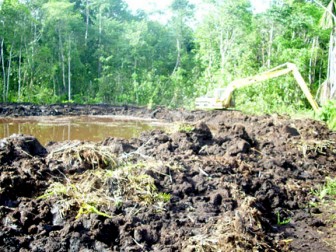Residents of Tobago Hill, in Region One’s Mabaruma Sub-Region, are refuting a government report that a community fish farm is nearing its first harvest, saying that there are currently no fish in the pond.
The project began in 2009, when the government launch-ed the National Secure Live-lihood Programme (NSLP) in 15 communities in the North West District (NWD) of Region One. It is being undertaken by the government in collaboration with the Voluntary Service Overseas (VSO) group.
Recently, the Government Information Agency (GINA) reported that Minister of Amerindian Affairs Pauline Sukhai had commended residents of the area for their hard work in preparing the fish ponds and caring and growing the fingerlings. The project was deemed as being successful while the authorities lauded similar projects being undertaken within the region.

But Toshao Edmund Santiago told Stabroek News that there are several obstacles hindering the project, which is expected to contribute towards the development of the six-year-old community when it materialises. The project site comprises four ponds, which are to be used alternately when the operation gets underway. Santiago said that the hassar and other fish species, including tilapia, will be reared at the two smaller ponds at the farm and as they grow, they will be placed in the other two adjoining ponds. He, however, noted that the ponds were remodelled some time last year, since they were not dug properly. He said that there was too much “sap” within the two pools.
“It do not have any fish right now… we just waiting on the weather to hold up, then we will put a few young fish in the ponds,” Santiago stated. He was also unsure about a timeline for the future activities. “Is the weather and several other things we got to think about,” he explained.
Santiago stated that when the project materialises, the community plans to market the fish to other communities in the region. The proceeds of the project, he added, will be used to enhance the development of Tobago Hill.
This newspaper made several attempts to obtain a comment from Minister Sukhai yesterday but she was reported to be occupied. Telephone numbers were also left with her office but calls were not returned.
Another Tobago Hill resident told this newspaper yesterday that he was surprised at the GINA report, which he read in last Thursday’s Stabroek News.
“I read in Stabroek News on Saturday that the project near completion but I know that’s not true. So, I called the captain and he said that they don’t even have fish in the ponds, which they had to remodel several times,” a Regional Democratic Council (RDC) member, living in the vicinity, noted.
The RDC councillor said the contents of the report were far from the truth. He explained that since the Filipino VSO volunteer left the area last year, the project has been at a standstill. He said that there had been a breakdown in communication between the authorities and the community as regards the future of the project. ”The people at Tobago don’t even know when it will bear fruit,” he added.
Residents of Tobago Hill, a Warrau community, were relocated to the area from the riverain Aruka Mouth and the authorities have stated recently that efforts are being made towards development.
According to the RDC Councillor, when the project got underway, the authorities encountered difficulties constructing the facility, since the ponds are located in a swamp. He said there were also hiccups with the design of the ponds, since the water source, the soil type, and the sizes of the ponds were not taken into consideration.
“Somebody had to benefit from this project, since large sums were spent on projects like this in this region and for it not to materialise three years after, it means somebody other than Tobago Hill gaining,” the councillor charged.
The NSLP is one of several initiatives implemented to strengthen the economic capacity of the indigenous people. The project is being undertaken as a pilot in Region One and will be expanded to the South Pakaraima, Karasabai and satellite communities in the North Pakaraima and South Rupununi.
The government has spent $88 million on the programme, of which $79 million was invested within the past two years. The programme has been aided by local agencies as well as 15 VSO volunteers specialised in the business and agriculture fields.





